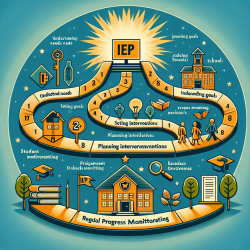Recent advancements in the study of aphasia, particularly conduction aphasia, have provided valuable insights into the nature of lexical access difficulties and how they can be effectively addressed in therapy. A pivotal research paper by Guylaine Le Dorze, focusing on a patient with severe word retrieval problems in conduction aphasia, offers a comprehensive view of innovative intervention strategies that could significantly improve the outcomes of aphasia therapy. This blog post aims to explore the key findings of this research and how practitioners can implement these strategies to enhance their therapeutic approach.
Conduction aphasia is characterized by a significant difficulty in word retrieval, impacting a patient's ability to communicate effectively. The research conducted by Le Dorze sheds light on a treatment designed to teach a word production strategy based on the written representation of the word and its initial phoneme. The intervention's success, demonstrated through an ABAB design, suggests a promising avenue for therapists looking to refine their treatment methodologies for aphasia patients.
Here are some practical strategies derived from the study that practitioners can incorporate into their therapy sessions:
- Focus on Written Representation: Encourage patients to visualize the written form of words as a cue for word production. This strategy leverages the patient's ability to recall the word's visual representation, facilitating easier access to the lexical form.
- Initial Phoneme Emphasis: Highlight the importance of the initial sound of words in therapy activities. This can help in anchoring the word retrieval process, making it easier for patients to access their vocabulary.
- Customized Therapy Activities: Design therapy activities that specifically target the individual's lexical access difficulties. Tailoring the intervention to address the unique challenges faced by each patient can lead to more effective outcomes.
- Repetition and Reinforcement: Incorporate repeated practice and reinforcement of the word production strategies. Regular practice can help in solidifying the gains made during therapy sessions.
The study also highlights the importance of a detailed assessment of the patient's lexical access difficulties before the intervention. By understanding the specific nature of the aphasia, therapists can better customize their approach to meet the patient's needs.
Moreover, the research suggests the potential for generalization of gains to untreated stimuli and the maintenance of acquired skills over time. This finding is particularly encouraging, as it indicates that the benefits of the therapy extend beyond the treatment sessions, contributing to long-term improvements in the patient's communicative abilities.
For practitioners interested in delving deeper into the specifics of the intervention and its outcomes, the original research paper provides a wealth of information. Etude des effets de l'intervention auprs d'un cas d'aphasie de conduction avec trouble d'accs au lexique offers a comprehensive analysis of the treatment's efficacy and its implications for aphasia therapy.
In conclusion, the research by Le Dorze presents a compelling case for the adoption of innovative strategies in the treatment of conduction aphasia. By focusing on the written representation of words and emphasizing the initial phoneme, therapists can enhance their approach to therapy, leading to significant improvements in word retrieval for individuals with aphasia. As the field of speech therapy continues to evolve, incorporating evidence-based practices will be key to delivering the most effective care to patients.










